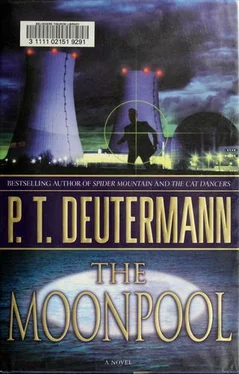P Deutermann - The Moonpool
Здесь есть возможность читать онлайн «P Deutermann - The Moonpool» весь текст электронной книги совершенно бесплатно (целиком полную версию без сокращений). В некоторых случаях можно слушать аудио, скачать через торрент в формате fb2 и присутствует краткое содержание. Жанр: Боевик, на английском языке. Описание произведения, (предисловие) а так же отзывы посетителей доступны на портале библиотеки ЛибКат.
- Название:The Moonpool
- Автор:
- Жанр:
- Год:неизвестен
- ISBN:нет данных
- Рейтинг книги:3 / 5. Голосов: 1
-
Избранное:Добавить в избранное
- Отзывы:
-
Ваша оценка:
- 60
- 1
- 2
- 3
- 4
- 5
The Moonpool: краткое содержание, описание и аннотация
Предлагаем к чтению аннотацию, описание, краткое содержание или предисловие (зависит от того, что написал сам автор книги «The Moonpool»). Если вы не нашли необходимую информацию о книге — напишите в комментариях, мы постараемся отыскать её.
The Moonpool — читать онлайн бесплатно полную книгу (весь текст) целиком
Ниже представлен текст книги, разбитый по страницам. Система сохранения места последней прочитанной страницы, позволяет с удобством читать онлайн бесплатно книгу «The Moonpool», без необходимости каждый раз заново искать на чём Вы остановились. Поставьте закладку, и сможете в любой момент перейти на страницу, на которой закончили чтение.
Интервал:
Закладка:
“My degree was in biology,” he said. “Herpetology, to be exact. I find snakes to be more predictable animals than most humans.”
Then his phone began to chirp. He stepped away from me, listened, swore, and snapped it shut.
“What now?” I asked.
“There’s been another one,” he said. “They got a radiation hit on a container.” He pointed with his chin at the forest of lighted gantry cranes upriver. “Over there, in the port.” He gave me a triumphant look. “See?” he said. “Told you that shit didn’t come from here.”
Then my phone rang.
“That’ll be Quartermain,” Trask said.
It was.
Tony, Pardee, and I met him at the Hilton, since none of us really knew our way around Wilmington yet. He was in the lounge having some coffee. He signaled the waitress to bring us some when he saw us.
“So,” I said, sitting down. “You and Helios off the hook?”
“Temporarily,” he said. “They got a radiation hit down in the container port. They have monitors all over the place, and each truck leaving the docks goes through two radiation scanners, one they know about, one they don’t.”
“What constitutes a hit?”
“They’re looking for gamma, primarily,” he said. “Gamma radiation indicates enriched uranium or plutonium, the bomb stuff. But any radionuclide will do it, and if a detector goes off, they lock down the entire port.”
“Bet that’s popular.”
“Oh, yeah. A colossal backup of cargo, containers hanging in midair. Ships that were supposed to sail at midnight missing their departure windows. Instant financial impact. Big deal.”
“Tough shit,” I said. “There is a war on, or so I hear.”
“Yeah, but that’s why they called us, among others. They wanted an instrument decon team from the Helios nuclear safety office. They’ve got radiation on or in a container but can’t find a source object.”
“How do we fit in?”
“I want you to see how an actual radiation incident is handled.”
He reached down and brought up a briefcase, opened it, and gave each of us a radiation dose monitor called a thermo-luminescent dosimeter, or TLD. It looked like a Dick Tracy wrist radio. I’d seen everyone in the plant wearing one, or more, and we’d been given temporary TLDs for our tour.
“These are your permanent TLDs,” he said. “They’ve been logged out to you by name and badge number, and you’ll turn them in weekly for readings. It’s your responsibility to look at them daily to make sure you have not received a dose you didn’t know about.”
“Good deal,” Tony muttered, examining the TLD suspiciously. It was bigger than the ones we’d worn for the tour. “I can remember when ‘receiving a dose’ meant something altogether different.”
“Same basic equipment tends to fall off your body,” Quartermain said without even a hint of a smile. “My team is already down there. Let’s boogie.”
We followed him in his official PrimEnergy car up to Third Street and then east through Wilmington to the container port. We went through some surprisingly elaborate security at the main gate, where we were given yet more, if temporary, ID badges, vehicle passes, and plastic hard hats. All this happened after they’d searched both vehicles, inside, out, and under. None of the people doing the searching seemed to care about the shepherds. There was already a double line of semis, each with a seagoing container strapped to its back, parked along both sides of the exit lanes. Some of the drivers were out along the road, smoking cigarettes and waiting for the flap to subside.
A container port requires vast amounts of horizontal space; Ari told us that the one in Wilmington consists of four hundred acres, most of it paved. There were none of the conventional warehouses one would associate with a seaport. The beauty of containers is that they’re weatherproof, so they just stack the outgoing containers ten high all over the place until it’s time to go to sea. Most of the incoming containers get dropped directly onto flat-frame trailers and go down the highway within minutes, literally, of being offloaded.
Unless there’s a problem. A twinkling cluster of red and blue lights down on the pier indicated that there was indeed a problem.
The gate people had told us not to drive onto the handling piers near the gantry cranes, so we parked next to a ten-pack stack and walked in. As we approached on foot, we could see several emergency vehicles parked at odd angles out on the pier but not too many people; apparently the nature of the problem was no longer a secret, and savvy humans were keeping their distance. I could see two guys in white spacesuits working around a single truck-and-trailer rig in the glare of both portable floods and the overhanging spotlights of an enormous gantry crane overhead. There was a cluster of mostly Asian faces peering curiously down from the high bows of a sixty-thousand-ton container ship.
I left the dogs in the vehicle. Quartermain took us over to a command center van bearing the markings of the Customs and Border Protection Agency, where a small crowd of Border Patrol cops, Coast Guard officers, and port authority officials stood around watching the moonwalkers inside the perimeter do their thing with instruments and sample kits. I noticed that the van was positioned upwind and that the bystanders were keeping a respectful distance. I half-expected to see the gangly figure of Creeps in the crowd, but none of these people looked like Bureau types. Tony popped a cigarette out of a pack, but one of the port authority guys immediately shook his head at him. Quartermain explained that some radiation came in the form of tiny airborne particles, so a spill scene was no place to be taking deep drags of air.
“Spill scene?”
“Procedurally, we’re treating this as a radiation spill, even though we know that’s not what it is,” he explained. “That’s a spill team, and they’re trained to find and decontaminate radioactive materials that shouldn’t be there.”
The back doors of the container had been opened, and we could see a stack of cardboard boxes filling the opening, packed right up to the container’s ceiling. One spacesuit man was incongruously on his back on a mechanic’s creeper, taking readings underneath the rig, while the other was on his knees holding a floodlight for him. A worried-looking middle-aged man in a suit and white hard hat came over when he spotted Quartermain, who introduced him to us as Hank Carter, security director for the Wilmington Port Authority.
“This isn’t making any sense, Dr. Quartermain,” he said. “We’ve got alarms, your guys are getting a lot of noise on the detectors, but we can’t find a single frigging point source on that can.”
“You got gamma?” Quartermain asked.
“No, alpha. It’s not high intensity-the levels are too low. It’s also spread out, like somebody painted the container with something radioactive.”
“Like water, maybe?” I said in a quiet aside to Ari.
He nodded. “Tell them to look for any accumulations of water, and test those,” he said.
“Water?” Carter said. “This is a container port; there’s water everywhere.”
“Tell them to look along the edges of that container or on the bottom of the trailer itself, in the cracks. All the places where water might linger after coming down off a ship. And check the truck.”
Carter gave Ari a sharp look, as if wondering whether the Helios security director knew something he didn’t and, if so, how. Then he went over to the command van and climbed in. Moments later we saw one of the spacesuited guys stop, listen to his radio, and give a thumbs-up sign that he understood. There was a rough-looking white man dressed in jeans and a sweatshirt sitting inside the van looking very uncomfortable, and I guessed that he must be the truck driver. I sent Tony and Pardee to go for an inconspicuous stroll around the temporary perimeter, just looking. I told them to fan out and see who or what might be watching the circus with more than casual interest.
Читать дальшеИнтервал:
Закладка:
Похожие книги на «The Moonpool»
Представляем Вашему вниманию похожие книги на «The Moonpool» списком для выбора. Мы отобрали схожую по названию и смыслу литературу в надежде предоставить читателям больше вариантов отыскать новые, интересные, ещё непрочитанные произведения.
Обсуждение, отзывы о книге «The Moonpool» и просто собственные мнения читателей. Оставьте ваши комментарии, напишите, что Вы думаете о произведении, его смысле или главных героях. Укажите что конкретно понравилось, а что нет, и почему Вы так считаете.









![Theresa Cheung - The Dream Dictionary from A to Z [Revised edition] - The Ultimate A–Z to Interpret the Secrets of Your Dreams](/books/692092/theresa-cheung-the-dream-dictionary-from-a-to-z-r-thumb.webp)


